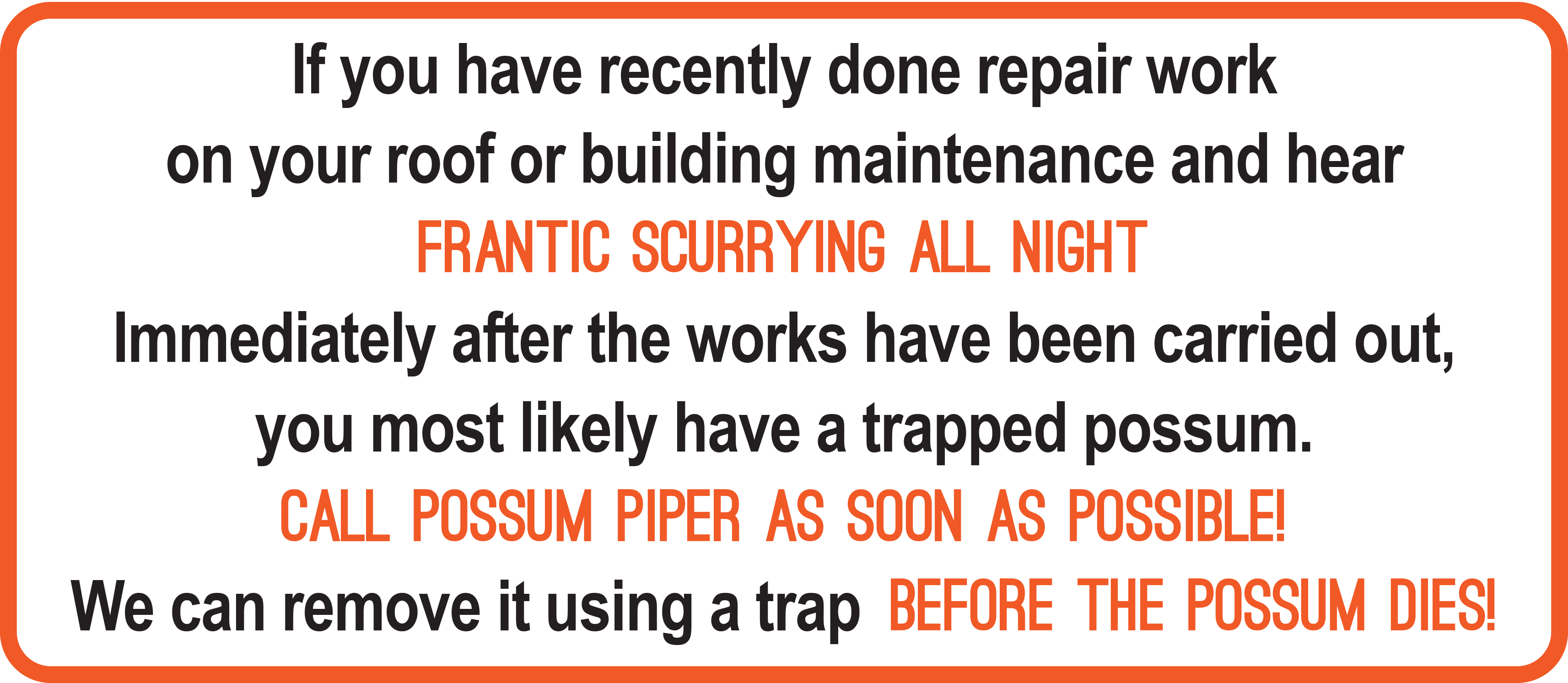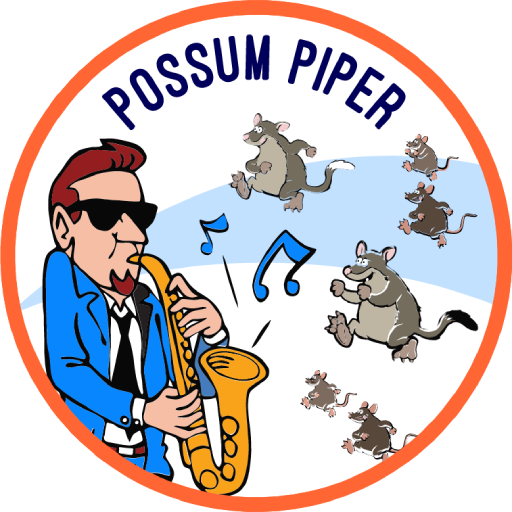
Dead possum: That unique, almost overpowering smell that hits you like a wave?
Have you ever encountered a dead possum? An unexpected and unwelcome visitor in your attic or roof cavity?
This is the stuff of nightmares for many homeowners. But it's also a problem that needs practical solutions.
You'll learn steps to prepare before professional removal arrives, diving deep into methods professionals use to remove dead possums.
But hey, if the thought of future infestations is as welcome as another lockdown (spoiler: it's not), there's no need to stress. We can offer advice to remedy that also.

Table Of Contents:
- Dead Possum: Understanding and Dealing With It
- Dead Possum: How to Identify if You Have One
- Preparing for Professional Removal
- Dead Possum Removal Services
- Dead Possum Prevention
-
Dead Possum Frequently Asked Questions
- What do you do if you find a dead possum?
- What to do with a dead possum in the garden?
- How do you tell how long a possum has been dead?
- How long does it take for a dead possum to start smelling?
- Do possums in Australia play dead?
- How do you dispose of dead possums in Australia?
- Do Councils offer a dead animal removal service?
- Do Pest Control companies remove dead possums?
- Conclusion

Dead Possum: Understanding and Dealing With It
Dead possum smell is quite distinctive. It's a foul stench that lingers, making it one of the key signs you've got an unwanted guest in your property.
A dead rat might only reek for 3 to 5 days, but brace yourself - a brushtail possum or a ringtail possum can cause up to two months' worth of olfactory assault.
Dead Possums: How to Identify if Yo Have One
If you suspect a deceased possum in your roof or wall cavity, be alert for certain signs:
- Foul odour: Over a few days, as the body decomposes, a strong, unpleasant smell will become noticeable.
- Presence of maggots: Fly larvae may start moving around and can sometimes fall from light fixtures.
- Staining: Liquefaction may lead to a brown stain appearing on the ceiling beneath where the deceased body is located in the roof cavity.
Related
- Possum Noises: A Guide to Species Identification.
- What Do Possums Eat and Possum Poop: Identifying Factors.
Preparing for Professional Removal
Dead possum professional removal services are available to help but you first need to take some crucial steps. First off, let fresh air circulate around the affected area as much as possible.
You might be tempted to mask the odour using air fresheners; resist the temptation as you could make locating and removing the dead animal more difficult due to its scent being covered up.
Dead Possum Removal Services
Dead possum on your property can be distressing. That's why professional possum removal experts are needed for compassionate removal, ensuring both respect for the animal and safety for you.
Understanding Removal Methods
The first step in dealing with a dead possum is identifying it. Often, the telltale sign is an unbearable smell from roof cavities or attics.
To ensure a smooth process when professionals arrive, ventilate the area well but avoid using air fresheners that could mask the distinctive odour.
When humane possum removal services come to help, they employ careful methods to remove these animals without causing more harm to their remains.
They might need to cut a hole for extraction - this service can increase costs; you will also need to engage in a builder or handyman to repair the area.
Dead possum removal and possum removal go hand in hand as a professional will also provide advice and steps on preventing this situation from recurring .
If you suspect that you might have a possum infestation in your roof, don't delay - act now. Hire a possum removal service . Your nose will thank you later.
Related
- Possum Removal: How to Get Rid of Possums Permanently.
- Possum Removalists: How to Choose the Right Expert.
Dead Possum Prevention
By identifying potential entry points, you can take action by sealing these entry points and prevent future infestations.
Identifying Potential Entry Points
Your property might have hidden access points that attract both the common brushtail possum and the common ringtail possum. These creatures often favour roof cavities due to the warmth and shelter they provide.
To make sure your home isn't an open invitation for these animals, check areas like roof vents, chimneys or any broken tiles.
Sealing off these spots helps in expelling dead possums as well as living ones from nesting in surrounding areas of your property.
Implementing Control Measures
In addition to securing potential entrances, consider installing deterrents to discourage them from entering your building structures. Examples of these that we recommend include Possum Boxes, Gutter Guard and Valley Guard and Tree Guard.
Dead animal in roof removal with a ceiling cavity and manhole access needs an expert dead possum removal service. Professional help is always available if needed.
Related
- Gutter Guard & Valley Guard Solutions for Possum Prevention.
- Tree Guard: The Essential Guide.
- Possum Box Installation: A Guide to Suitable Habitats.
Dead Possum Frequently Asked Questions
What do you do if you find a dead possum?
Before anything else, check to see if it is a female with a pouch just below the chest on the belly area; you may need to turn it over if it is face down, use rubber gloves and gently pull open the pouch to check inside the pouch for a small pink creature which is a joey, IT WON'T JUMP AT YOU!
If you come across a live baby possum, contact your local wildlife group. They will ensure the young possum is cared for and raised until it's ready for safe and humane release into the wild. If there isn't a baby involved, you have the option to dispose of it at your local vet (this is a free service they provide) or consider seeking assistance from a professional.
What to do with a dead possum in the garden?
Avoid touching it directly; use rubber gloves and place it in heavy-duty rubbish bags (double bagged and sealed). You can dispose of it at your local vet (this is a free service they provide).
Alternatively, hire humane possum removal professionals who are trained for this kind of situation.
How do you tell how long a possum has been dead?
In vertebrates, five stages of decomposition are typically recognised:
- Initial decay - 0-3 days after death.
- Putrefaction - 4 to 10 days after death.
- Black putrefaction - 10 to 20 days after death.
- Butyric fermentation - 20 to 50 days after death.
- Dry/skeletonized decay - 50 to 365 days after death.
For a more detailed explanation, see here.
How long does it take for a dead possum to start smelling?
Dead possum undergoes natural decomposition, releasing organic compound odour molecules that our sense of smell can detect.
Initially, the odour may be subtle, but after approximately three days following the animal's death, it can become quite potent. The intensity of the odour depends on several factors:
Size of the Animal: Larger animals produce more decomposing tissue, producing stronger odour. For example, a deceased possum emits a more pronounced odour than a dead mouse.
Animal Species: Different animals produce distinct odours as they decompose. Dead rats, in particular, emit a foul odour relative to their body weight. Dead rodent removal should be done by the experts as find and removing these animals can be challaging.
Location of the Carcass: The placement of the deceased animal is crucial. If it is situated within a central wall with poor ventilation, the smell can be overwhelming. Conversely, if it's located near a ventilated soffit at the edge of the attic, the odour is less noticeable.
State of Decomposition: Initially, the odour is weak but intensifies over time. As maggots consume the carcass and its mass decreases, the odour gradually diminishes. The odour's lifecycle varies depending on the animal's size.
Temperature: Higher temperatures accelerate the animal's decomposition process. Additionally, odour molecules disperse more prominently in warmer conditions, resulting in a stronger smell.
Humidity: Odour perception is typically heightened under increased humidity levels.
Air Flow: Air circulation plays a significant role. Sometimes, individuals may notice that the odour is stronger in the morning. This phenomenon depends on airflow patterns.
For instance, if the deceased animal is in the attic, odour molecules might descend to the house level as the attic cools during the night, while they rise back up during the day when the attic heats up, leading to a less pronounced foul smell inside the house.
Do possums in Australia play dead?
It's their defence mechanism when faced with danger – hence the phrase 'playing possum'.
How do you dispose of dead possums in Australia?
Proper Disposal of Deceased Wildlife
It's crucial to handle the disposal of deceased animals correctly. There are several suitable methods:
Burning by Incineration: The ultimate and preferred way to dispose of the dead possum is to bring it to your local vet as this is a free service they provide and they also check for any joeys that may be alive in the pouch.
Council Waste Service: Most Councils accept small animals like birds, small mammals, and reptiles in their wheelie-bin service. Remember to securely wrap them in multiple plastic bags before placing them in the bin. If the rubbish service day has passed, keep the animal frozen until the next service day.
Burying: Animals should be interred at a depth of at least 45cm, with rocks or logs placed over the burial site to deter domestic or wild dogs and foxes from digging up the animal carcass.
Refuse Station: Many Councils provide public refuse stations specifically designed for burying deceased animals. Some even permit wildlife rehabilitators to dispose of animals at no cost. When taking diseased animals or birds to refuse stations, ensure they are contained in plastic or body bags to prevent scavengers from accessing the carcass.
Natural Decomposition in the Bush: This allows other wildlife the opportunity to consume the carcass. Ensure that the animal is placed away from residential homes. Only animals that have died from trauma injuries should be disposed of in this manner; do not dispose of diseased or euthanised animals in this way.
Remember to consult your local Council for any specific requirements they may have in your region. If your local vet euthanises an animal, they will typically arrange for its disposal. Animals euthanised with veterinary euthanasia drugs should be disposed of through burying or incineration.
Do not leave the carcass in the bush for other animals to consume.
Do Councils offer a dead animal removal service?
Councils will remove dead animals off public land/ If it is on your private property, it is your responsibility.
Do Pest Control companies remove dead possums?
Some pest control companies will remove dead possums, but they usually only handle insect and rodent pests.
Conclusion
Dead possum smells are not pleasant. Understanding this distinctive odour will allow you to prepared for when professional removal arrives, ensuring safe extraction.
Humane methods are at play here. Every effort is made to respect our wildlife during this process.
If there's one thing we all dread, it’s future infestations! But don't fret – now you understand that potential entry points and control measures can be implemented to ensure this situation doesn't happen again.

More Possum articles you may like:
- Possum Trap: Essential Do’s and Don’ts for Success.
- Catch and Release Licences: How to Remove Possums Legally.
- Rat Bait: Navigating Successful Pest Management.
- How to Get Rid of Rats: Rodent Control Strategies that Work.
- Rat Traps: The Ultimate Guide to Bait Free Rodent Control.
- Rat Identification: Signs of Rodent Activity.



